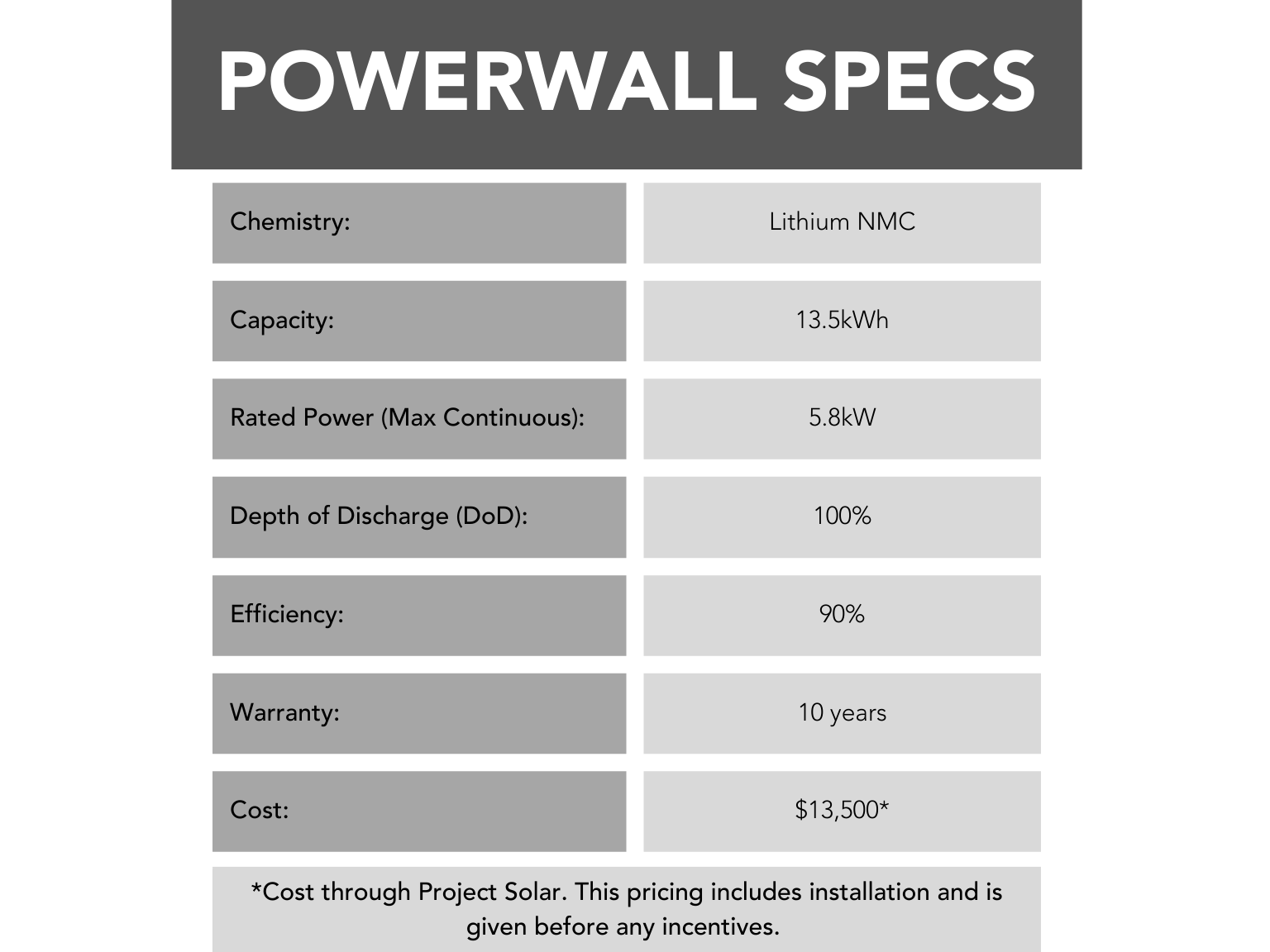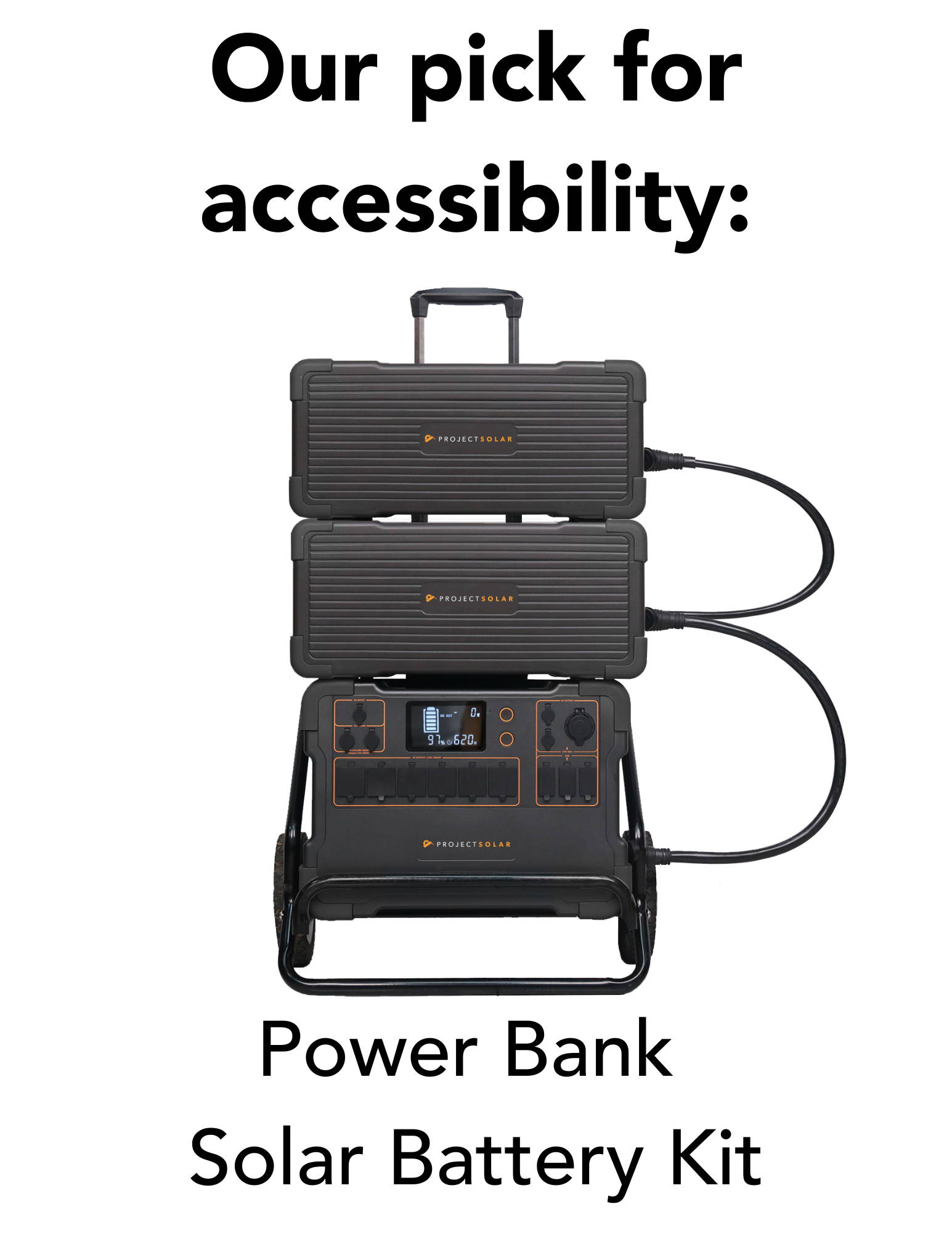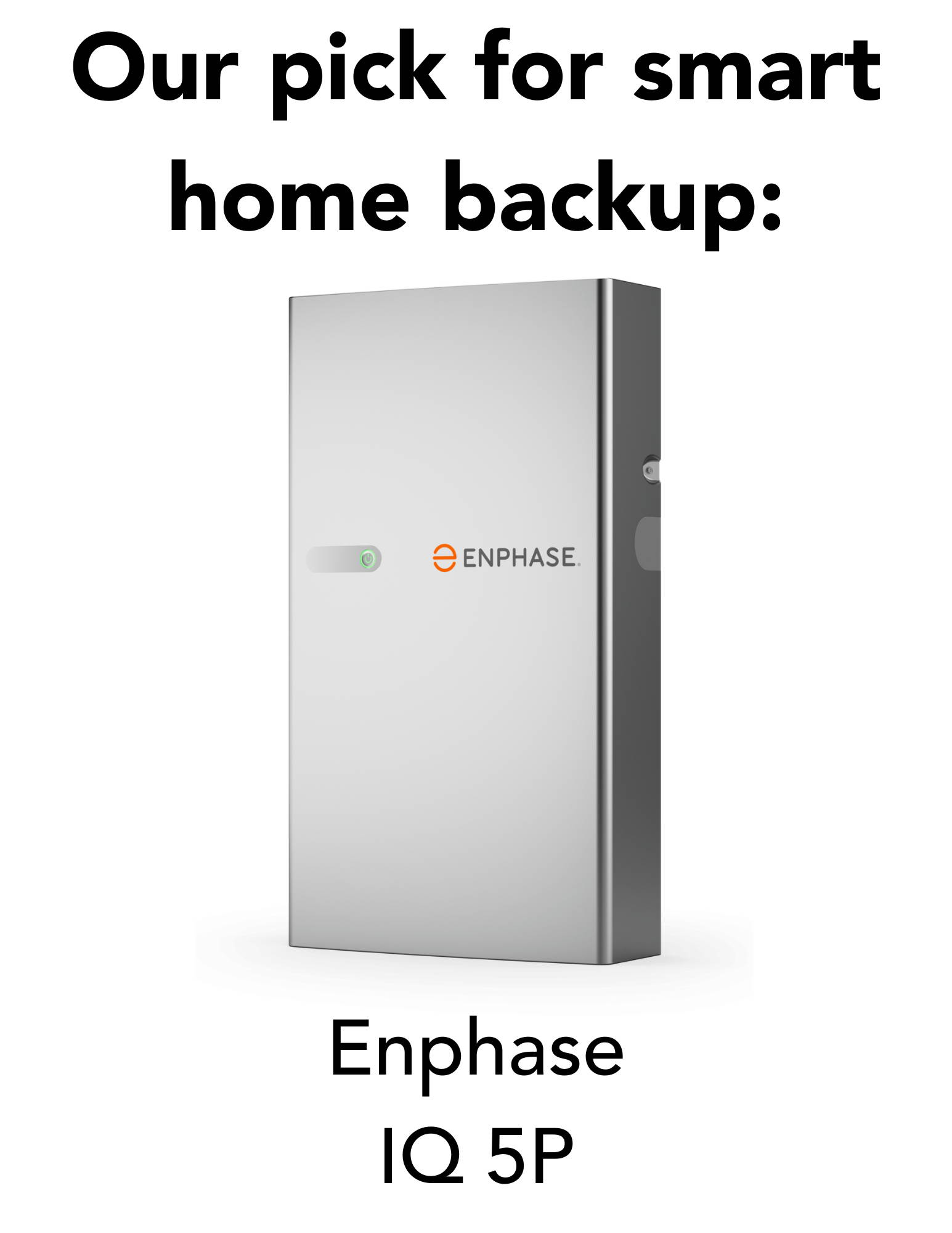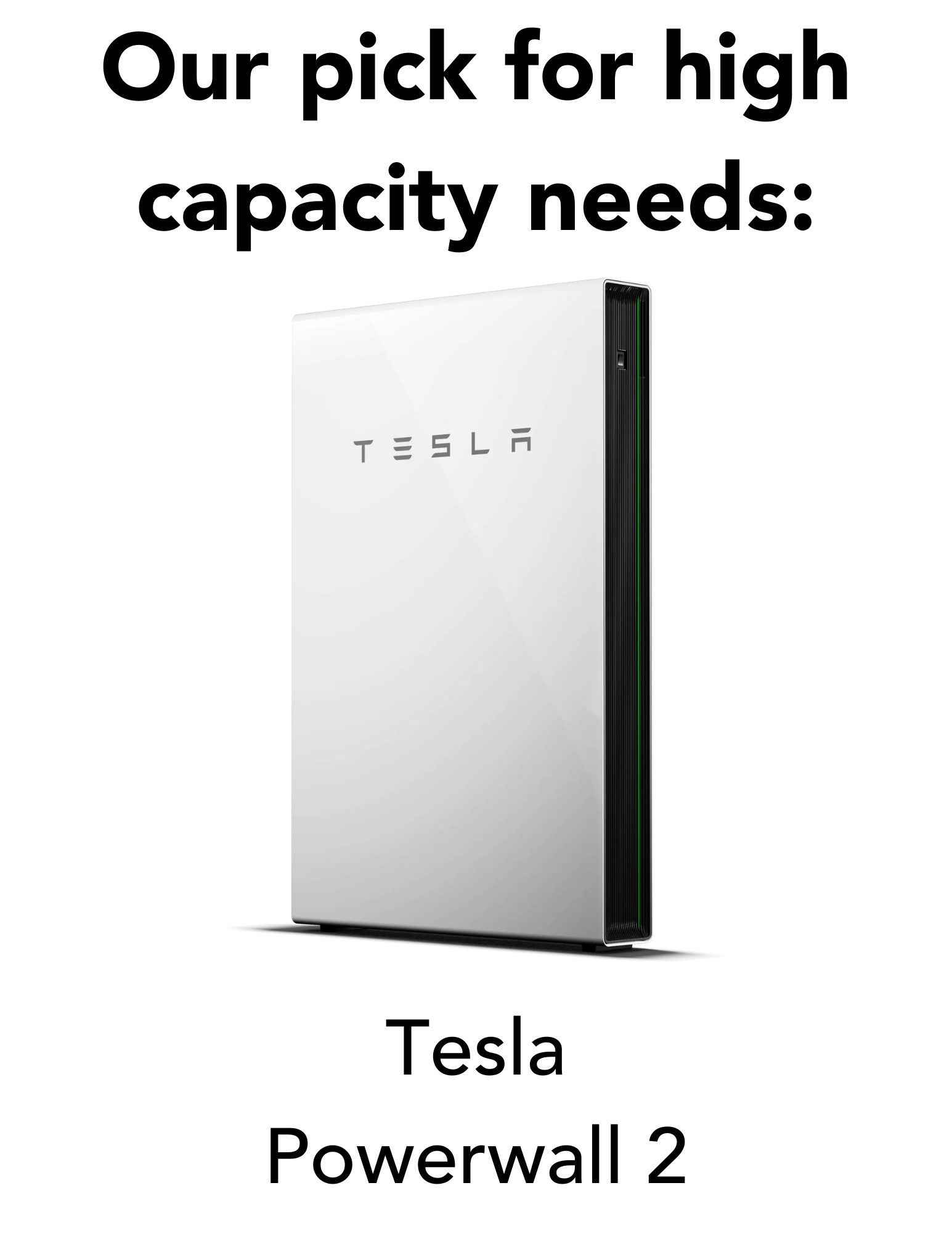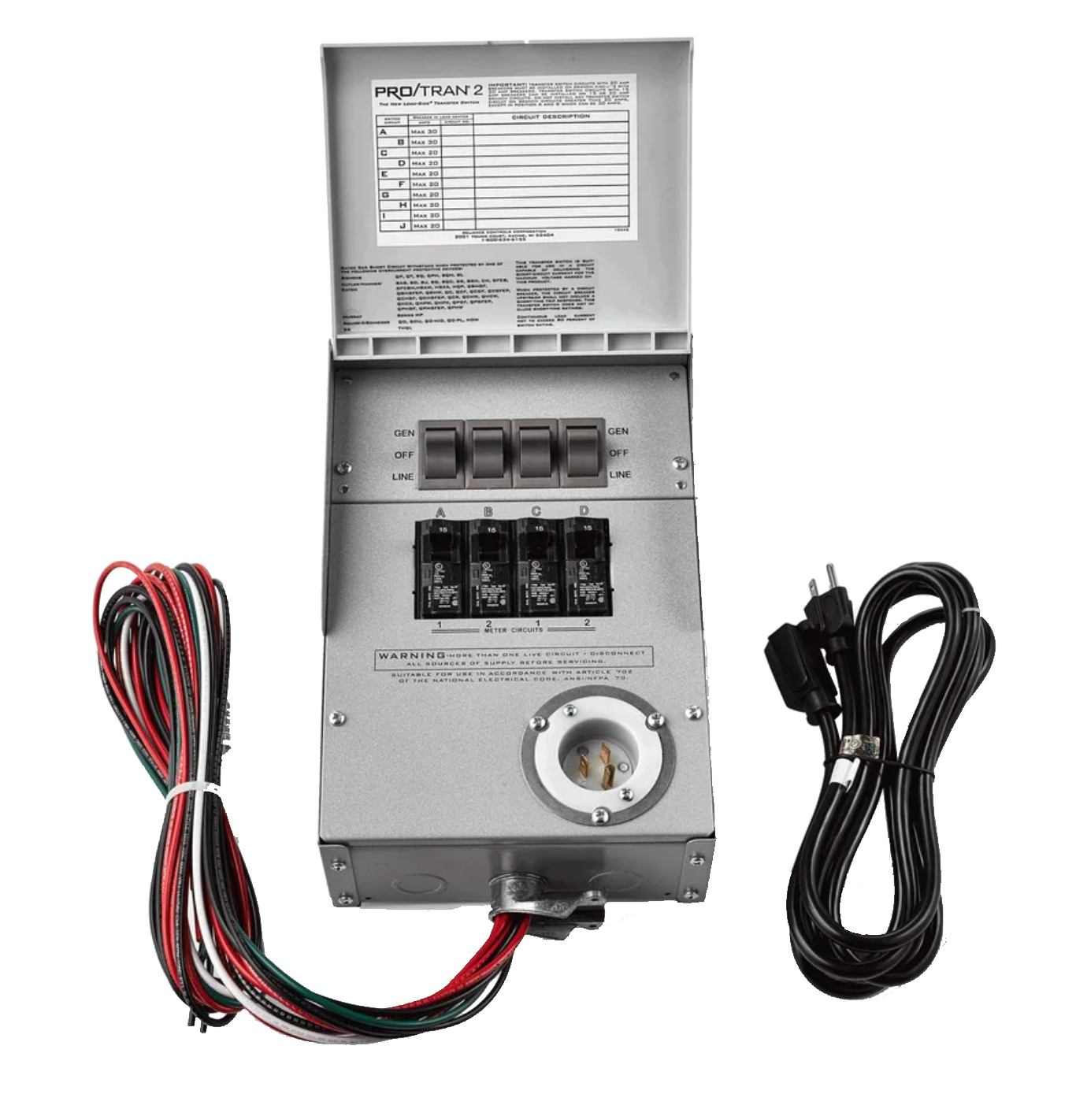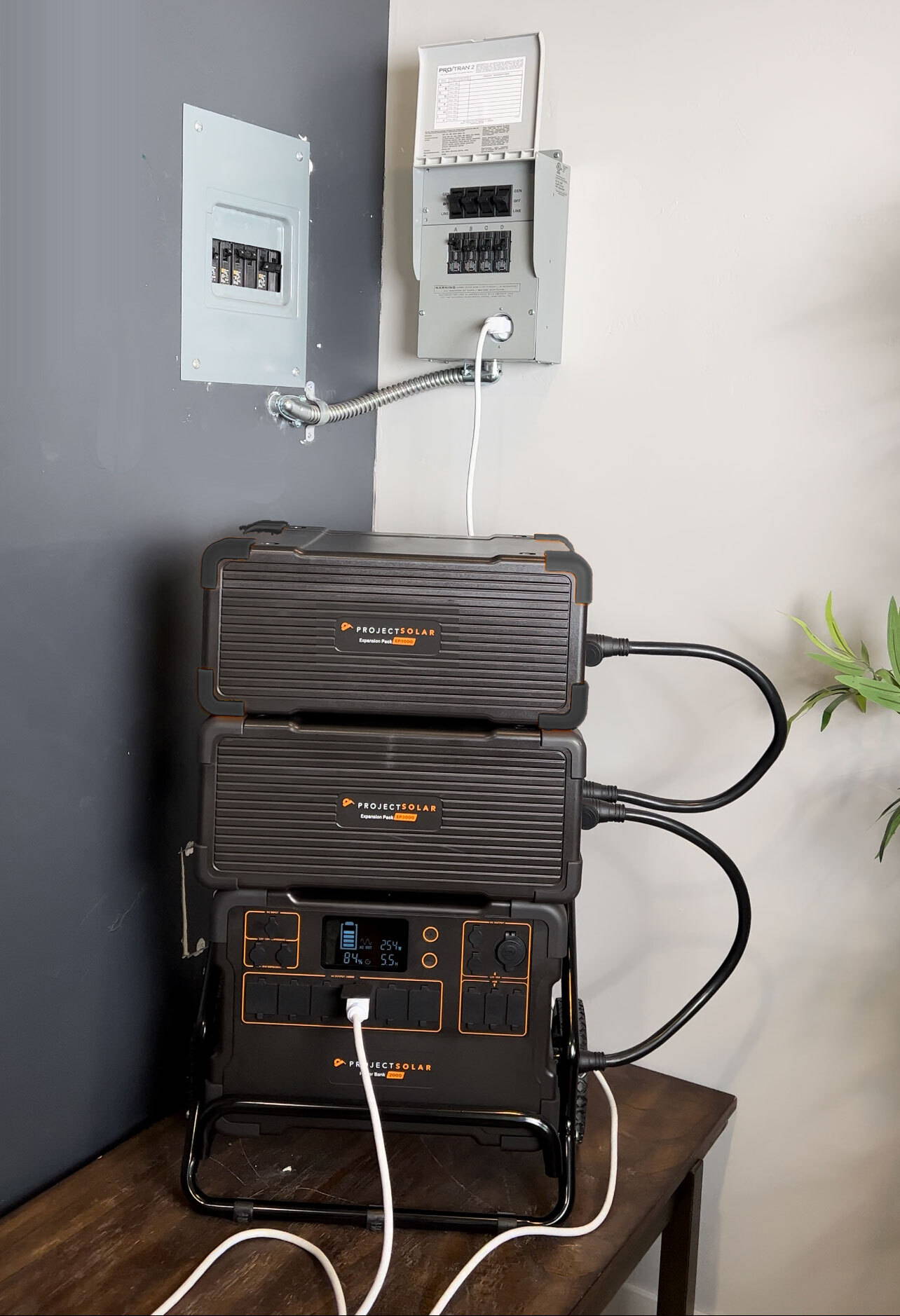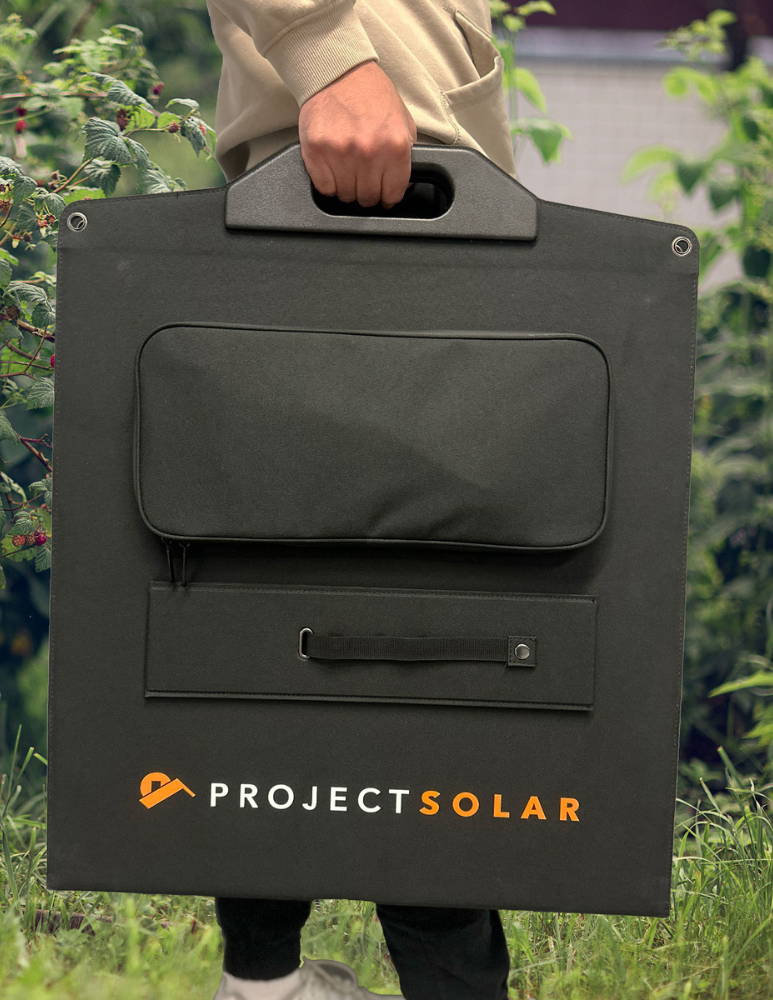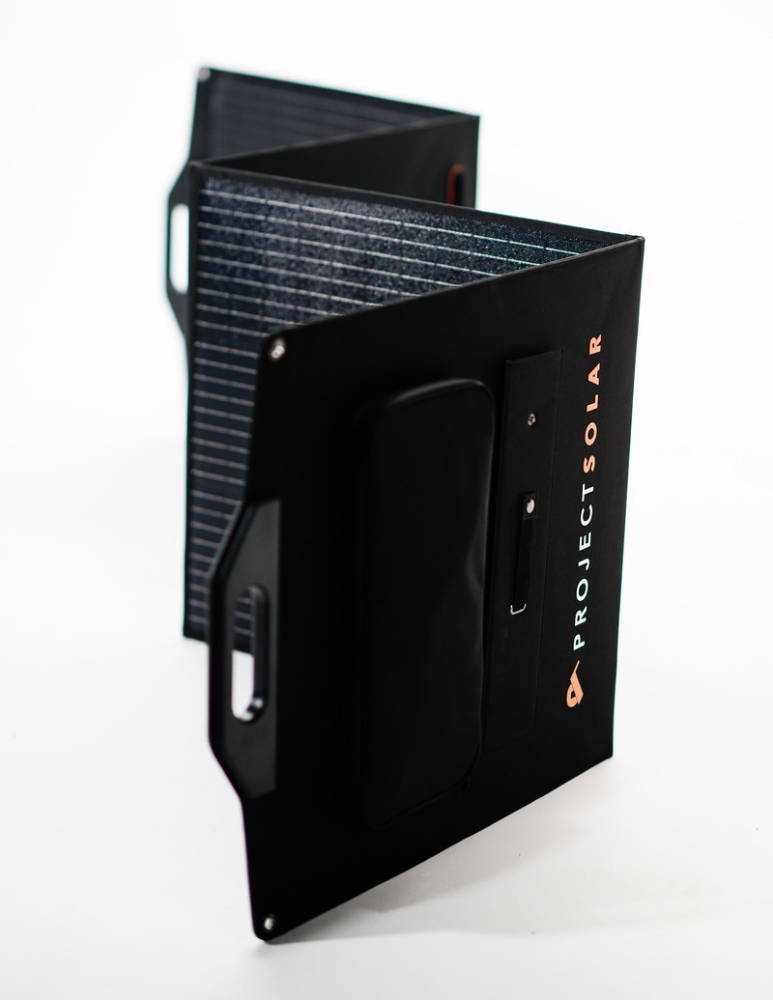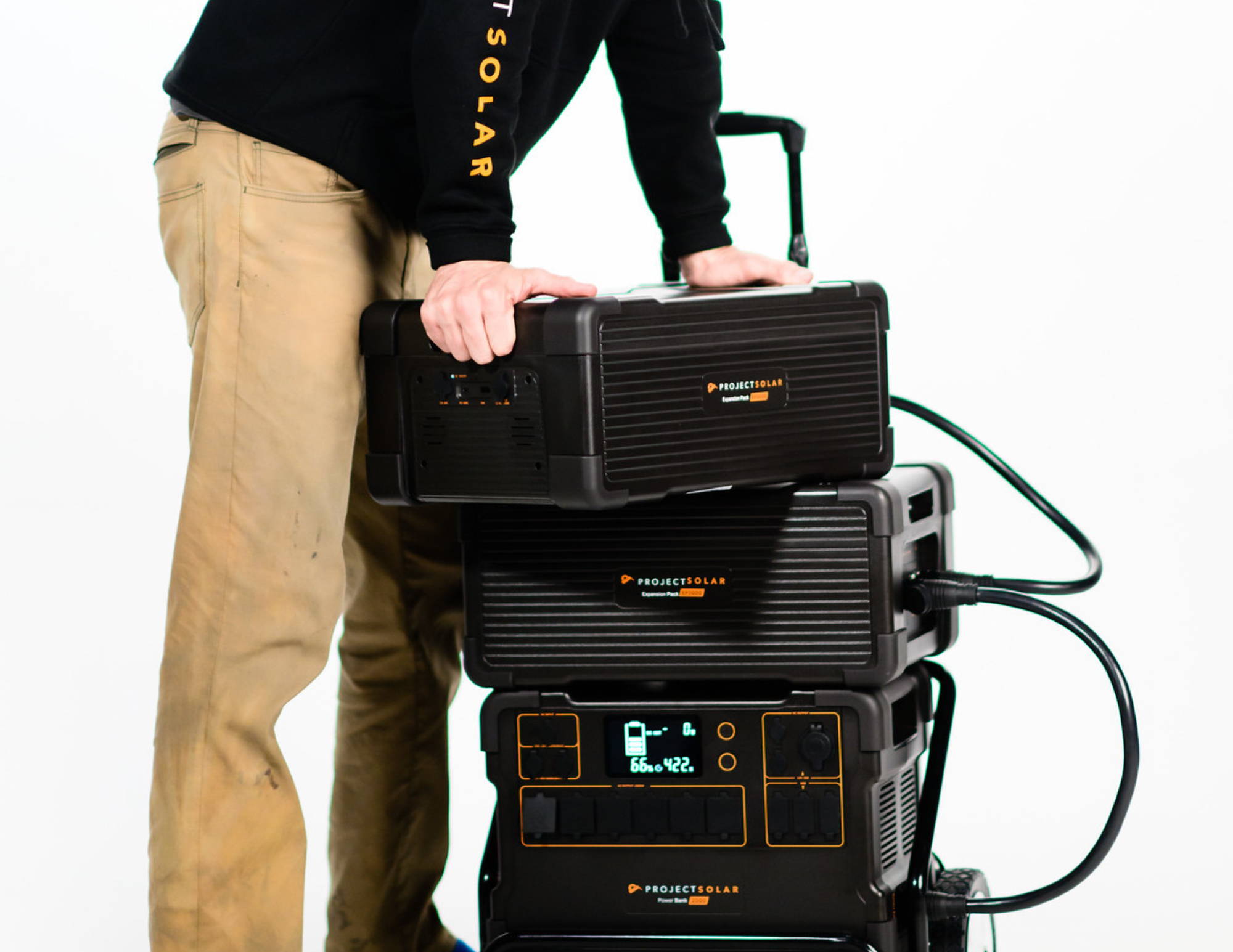Our Top Picks for Home Solar Backup
Quick Comparison
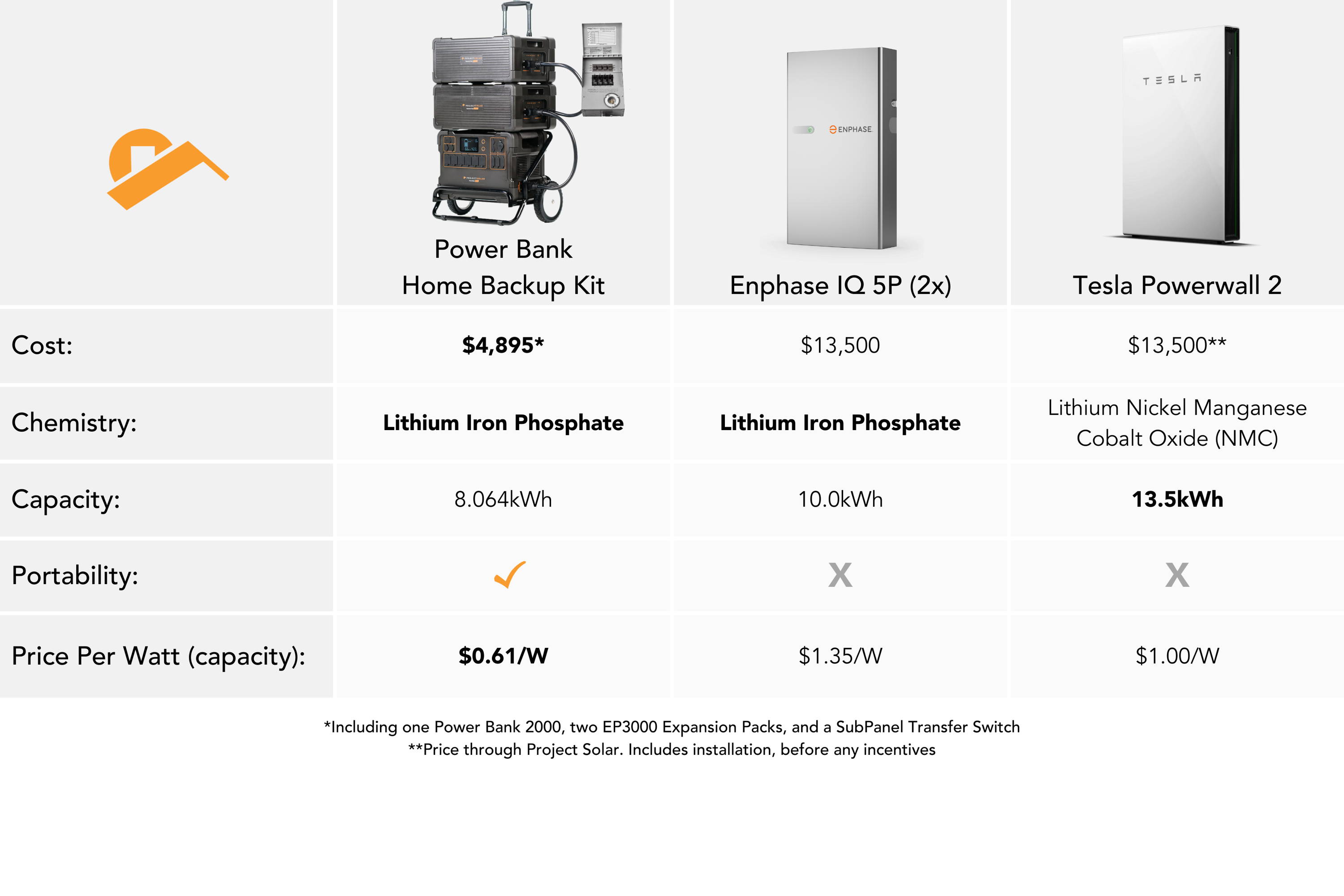
Our Pick for Accessibility:
Power Bank Solar Battery Kit
from Project Solar
Benefits
- least expensive on the list
- off-grid friendly
- expandable with multiple sizes available
- portable (carrying handle/trolley included)
- some abilities to integrate with home
- available to renters, van lifers, mobile/tiny home owners, and others who can't install a solar system
- optional solar panels for charging
- Lithium Iron Phosphate (LFP) battery chemistry
Limitations
- shortest warranty (18 months)
- automatic backup not supported
Project Solar's new solar backup option, the Power Bank, is a battery for everyone.
The Power Bank Solar Battery Kit is available in multiple sizes, and expandable. For the purposes of this article, we will compare specifics based on a configuration of one Power Bank 2000 with two Expansion Packs.
We chose this as our most accessible pick for a reason--it's affordable, portable, and versatile.
The Power Bank Solar Battery Kit is available in multiple sizes, and expandable. For the purposes of this article, we will compare specifics based on a configuration of one Power Bank 2000 with two Expansion Packs.
Features
The Power Bank uses top-of-the-line Lithium Iron Phosphate (LFP) technology. The addition of iron to the battery chemistry reduces heat generation, which improves efficiency and safety--plus, LFP batteries last longer than other lithium battery types.
One of the best parts about the Power Bank 2000 is its accessibility. Regardless of whether you have a home solar system or not, you can purchase and use this option.
If you're a homeowner with a solar system, your solar power can top up your Power Bank with your solar power. If you don't have a solar system, no problem: you can simply charge your battery with grid power or add our portable solar panels to charge it using green energy.
After it's been charged, you can plug in your devices & appliances, or use a subpanel to connect the Power Bank to your home's essential circuits for a more seamless backup process. With a throw of a switch, those loads will become grid-independent.
And, speaking of grid independence, this is the only battery on this list that is completely off-grid. You can bring it with you pretty much anywhere, especially with the included EZ Cart hand trolley.
One of the best parts about the Power Bank 2000 is its accessibility. Regardless of whether you have a home solar system or not, you can purchase and use this option.
If you're a homeowner with a solar system, your solar power can top up your Power Bank with your solar power. If you don't have a solar system, no problem: you can simply charge your battery with grid power or add our portable solar panels to charge it using green energy.
After it's been charged, you can plug in your devices & appliances, or use a subpanel to connect the Power Bank to your home's essential circuits for a more seamless backup process. With a throw of a switch, those loads will become grid-independent.
And, speaking of grid independence, this is the only battery on this list that is completely off-grid. You can bring it with you pretty much anywhere, especially with the included EZ Cart hand trolley.
Cost
The Power Bank is one of the most affordable solar backup alternatives on the market. It is significantly less expensive than a home battery system and can provide similar backup power capabilities.
At $4,893, the Power Bank comes in at fraction of the cost of our other battery options.
At $4,893, the Power Bank comes in at fraction of the cost of our other battery options.
Customers looking for lower-capacity backup can expect to spend much less--purchasing the Power Bank 2000 will set you back less than $1,700, and there's a smaller model available as well for $500.
Of course, additional accessories, particularly our 200W portable solar panels, can add to the cost. However, even with these extras, the Power Bank remains a highly affordable, accessible option for those seeking a portable solar backup solution.
Overall, the Power Bank offers an excellent value for its price, providing reliable backup power in a compact and affordable package.
Specifications
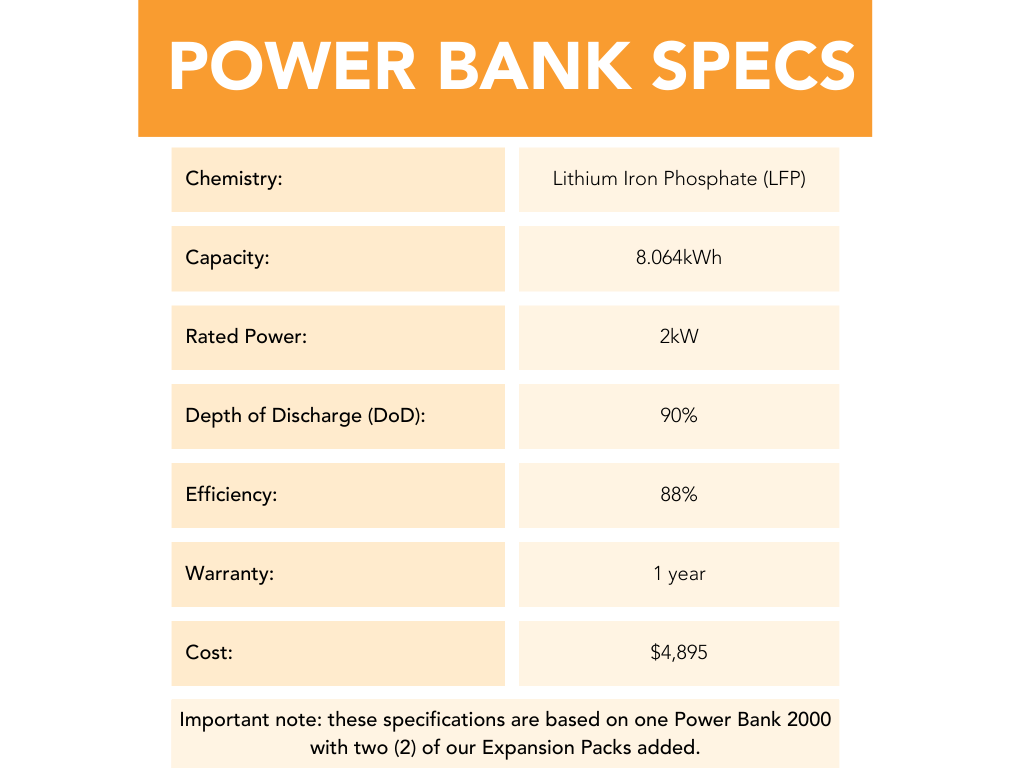
Our Pick for Smart Home Backup:
IQ 5P
from Enphase Energy
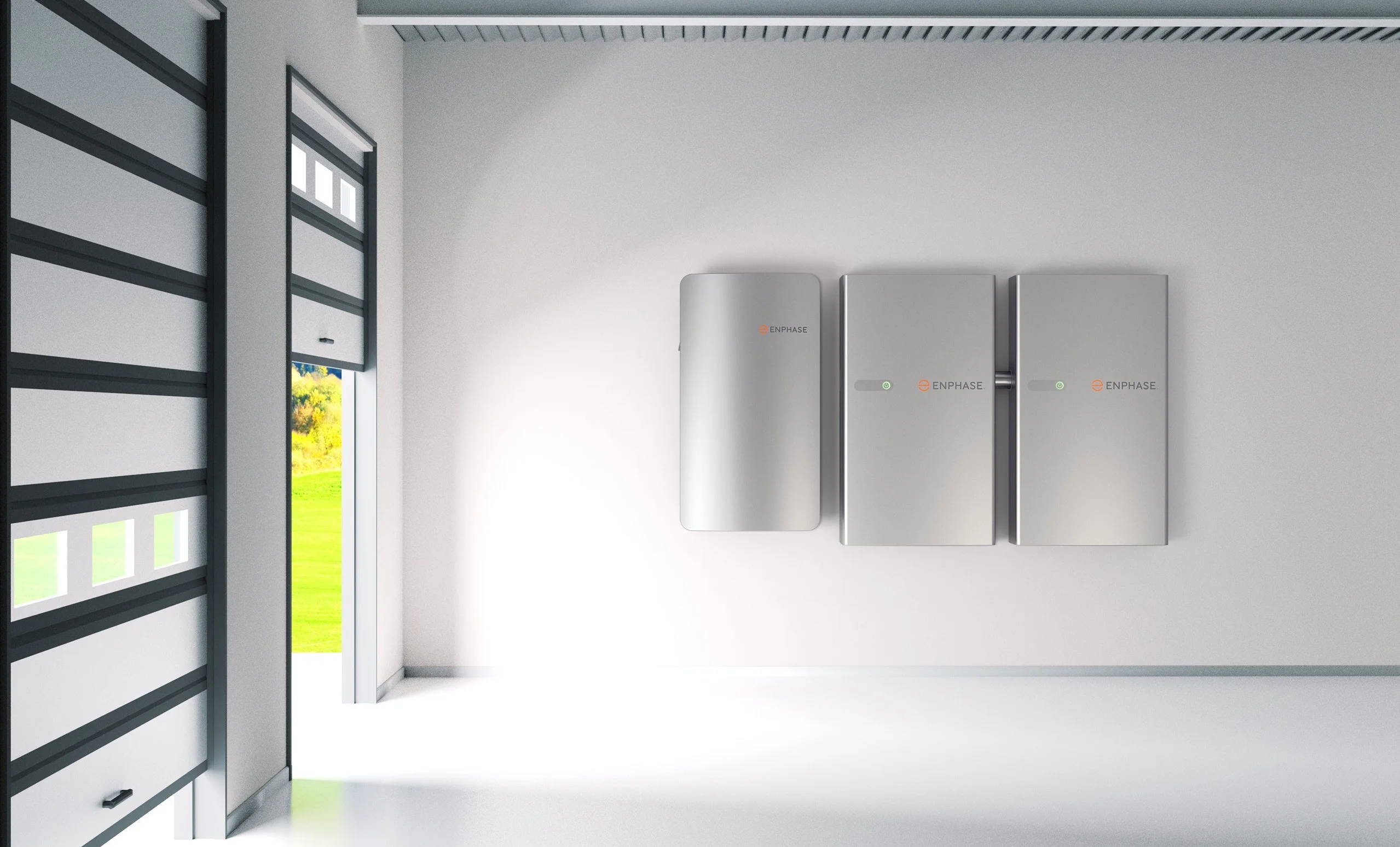
Benefits
- Smartest battery on the list
- Longest warranty
- Integrates with home and solar system
- Expandable with multiple sizes available
- Passive cooling
- Lithium Iron Phosphate (LFP) battery chemistry
- Fully automatic backup
Limitations
- Price
- Only available with a home solar system
Enphase's newest battery option, the IQ 5P, is a smart battery that seamlessly connects to our Enphase microinverters.
Other batteries may be able to connect to our microinverter systems, but none will be able to monitor and manage the system as efficiently as a battery from Enphase.
Other batteries may be able to connect to our microinverter systems, but none will be able to monitor and manage the system as efficiently as a battery from Enphase.
Features
The Enphase IQ 5P is a top-of-the-line home battery solution that provides reliable and intelligent backup power. This battery can provide fully automatic backup power during outages, and its abilities to adapt to your energy usage patterns help to improve efficiency and extend battery life.
Expandable and available in multiple sizes, the IQ 5P comes with a 15-year/6,000-cycle warranty.
Like the Power Bank, the IQ 5P uses Lithium Iron Phosphate battery chemistry, which is known for its safety, reliability, and longer lifespan. It also allows this battery to utilize passive cooling, one of Enphase's coolest features. Passive cooling involves no moving parts, improving efficiency while keeping noise to an absolute minimum.
Perhaps most notably, the IQ 5P provides seamless backup power in the event of an outage. This means that no manual intervention is required, and attached loads won't be interrupted.
Although it is more expensive than some of the other options on the market and cannot be purchased as a stand-alone battery, the IQ 5P's reliability, adaptability, and convenience make it an excellent choice for homeowners who prioritize their peace of mind.
Although it is more expensive than some of the other options on the market and cannot be purchased as a stand-alone battery, the IQ 5P's reliability, adaptability, and convenience make it an excellent choice for homeowners who prioritize their peace of mind.
Cost
At Project Solar we use a salesman-free pricing model, enabling us to offer this battery for less than other companies. Two IQ 5P batteries cost $13,500 (fully installed, before any incentives).
To add an Enphase battery to your system, you'll need to also install a System Controller--this basically works as a transfer switch that will disconnect you from the grid during outages.
The System Controller is included in our battery pricing, but you only need one of these for your entire system, even if you're installing multiple batteries. For this reason, each additional IQ 5P you purchase will only cost $5,000 (fully installed, before incentives).
These batteries aren't the most DIY-friendly, but it is possible to add them to a DIY project with Project Solar. However, you will need to take a course on Enphase's website to become certified, and the batteries weigh in at over 150 pounds each.
To add an Enphase battery to your system, you'll need to also install a System Controller--this basically works as a transfer switch that will disconnect you from the grid during outages.
The System Controller is included in our battery pricing, but you only need one of these for your entire system, even if you're installing multiple batteries. For this reason, each additional IQ 5P you purchase will only cost $5,000 (fully installed, before incentives).
These batteries aren't the most DIY-friendly, but it is possible to add them to a DIY project with Project Solar. However, you will need to take a course on Enphase's website to become certified, and the batteries weigh in at over 150 pounds each.
Specifications
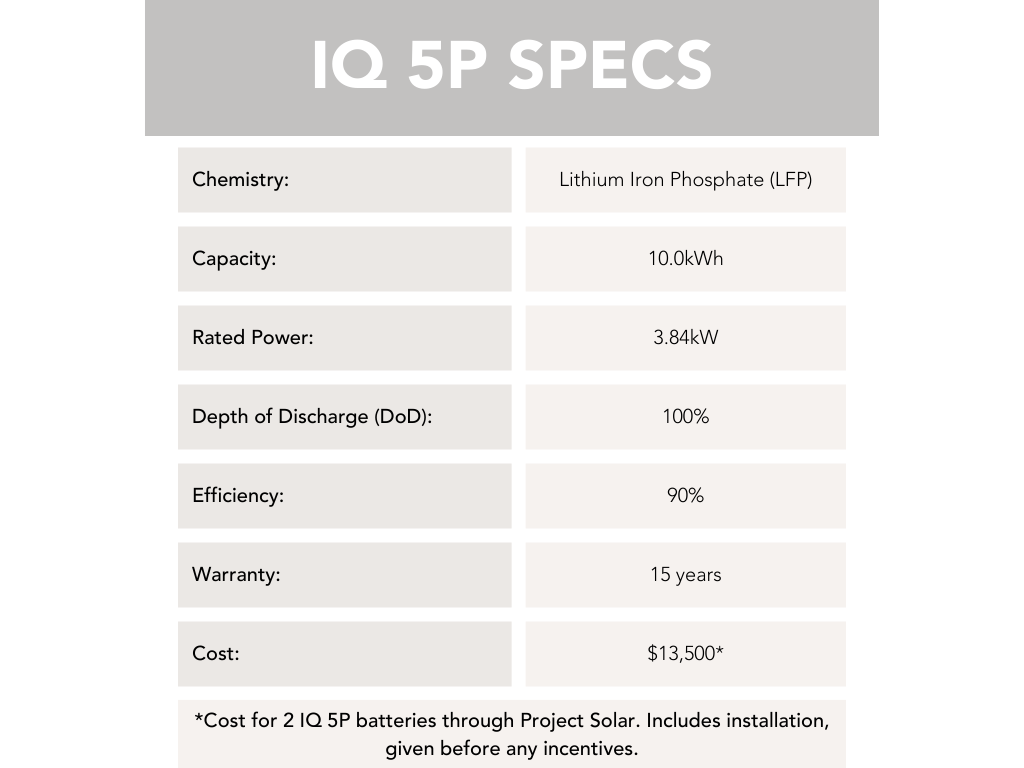
Our Pick for High-Capacity Needs:
Powerwall 2
from Tesla
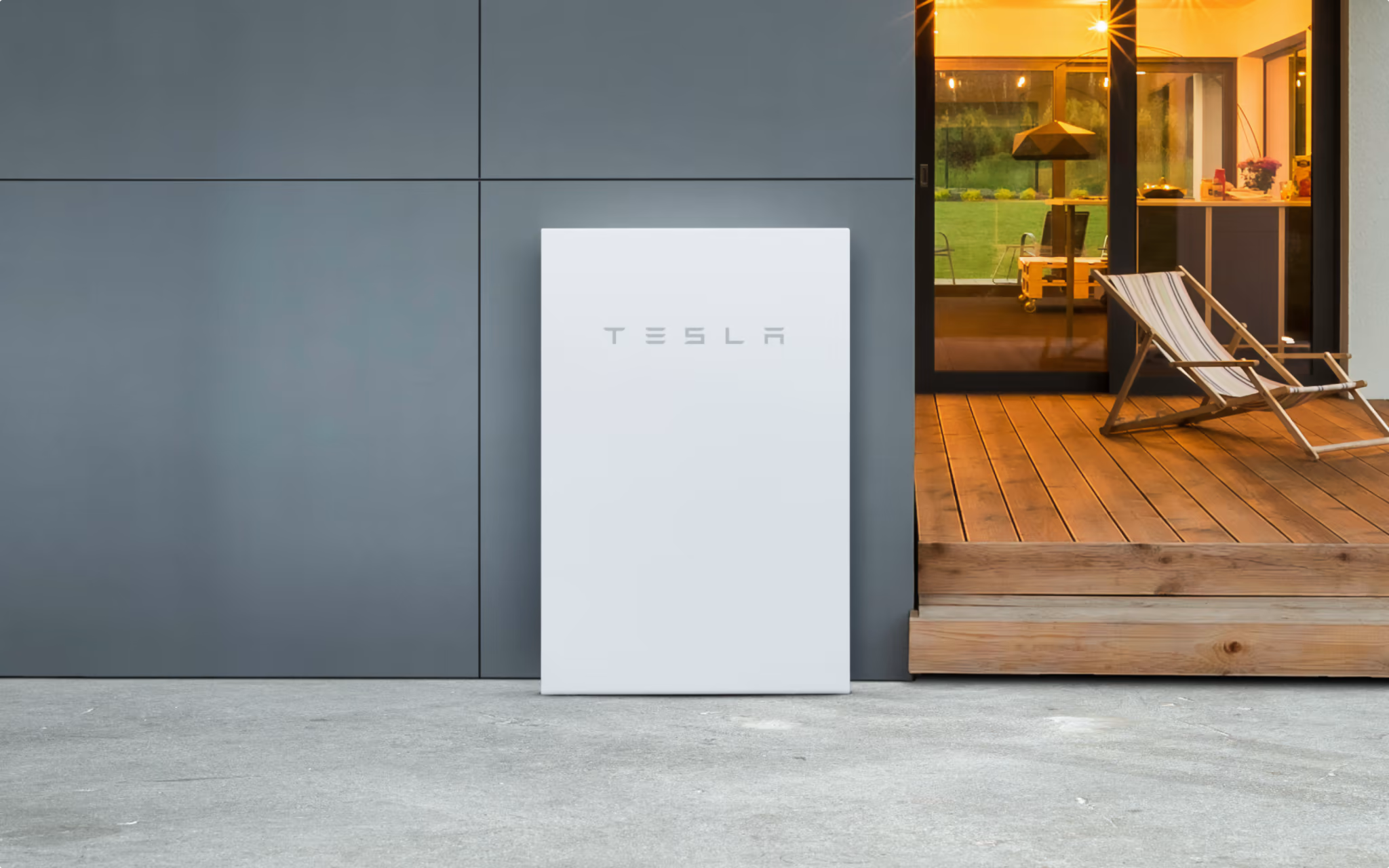
Benefits
- highest capacity and power on the list
- expandable (up to 10 Powerwalls)
- works well with string inverter systems
- high efficiency
- 10 year warranty
Limitations
- limited monitoring/controlling functionality when integrated with microinverter systems
- not available for DIY installs
- only available with a home solar system
- Lithium Nickel Manganese Cobalt Oxide (NMC) battery chemistry
- cost
The final battery on this list is by far the most well known: the Tesla Powerwall 2.
Tesla has established a worldwide reputation for its electric vehicles, not to mention CEO Elon Musk's eccentric ideas and recent Twitter antics. But hey, we're not here to talk about that. We're here to talk about the Powerwall.
Tesla has established a worldwide reputation for its electric vehicles, not to mention CEO Elon Musk's eccentric ideas and recent Twitter antics. But hey, we're not here to talk about that. We're here to talk about the Powerwall.
Features
The Tesla Powerwall 2 is a popular option for many homeowners because of its high capacity and expandability. With the ability to add up to 10 Powerwalls, it's a great option for larger homes or homes with high energy needs.
It also works well with string inverter systems and can be a good option for Tesla owners who already have experience with the company. Additionally, it comes with a 10-year warranty.
It also works well with string inverter systems and can be a good option for Tesla owners who already have experience with the company. Additionally, it comes with a 10-year warranty.
However, there are some negatives to consider.
Project Solar customers who install a Powerwall can't take full advantage of their system's smart features, particularly the capabilities that come with the Enphase App. Project Solar systems use Enphase microinverters exclusively, and connecting them to a Powerwall won't be as seamless as an Enphase battery.
Additionally, the Tesla Powerwall utilizes Lithium Nickel Manganese Cobalt Oxide (NMC) battery chemistry.
This type of battery allows for a higher capacity and is able to charge more efficiently at lower temperatures, but it generates more heat with a lower thermal runaway than the Lithium Iron Phosphate battery chemistry used by the other two batteries on this list. It's important to note, however, that all lithium-based solar batteries are regarded as generally safe.
Project Solar customers who install a Powerwall can't take full advantage of their system's smart features, particularly the capabilities that come with the Enphase App. Project Solar systems use Enphase microinverters exclusively, and connecting them to a Powerwall won't be as seamless as an Enphase battery.
Additionally, the Tesla Powerwall utilizes Lithium Nickel Manganese Cobalt Oxide (NMC) battery chemistry.
This type of battery allows for a higher capacity and is able to charge more efficiently at lower temperatures, but it generates more heat with a lower thermal runaway than the Lithium Iron Phosphate battery chemistry used by the other two batteries on this list. It's important to note, however, that all lithium-based solar batteries are regarded as generally safe.
Cost
When it comes to cost, the Tesla Powerwall 2 is the most expensive option on this list--however, it's also the most powerful.
We offer the Powerwall for $13,500, meaning it's a significant investment for homeowners.
We offer the Powerwall for $13,500, meaning it's a significant investment for homeowners.
All in all, the Powerwall has some great features that can meet high-capacity needs, even if the upfront price is higher than other options.
Specifications
